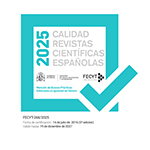The Conquest of Mexico in the political cultures of Spanish romantic nationalism (1829-1850)
Abstract
The article addresses the role of the representations of the Conquest of Mexico in the processes of nationalization orchestrated by the political cultures of post-revolutionary Spain. The research focuses on the period that went from the definitive failure of the attempts to reconquer the old Viceroyalty of New Spain until the middle of the century, thus coinciding with the rise of romantic historicism in Spain. In the first place, and starting from a constructivist paradigm, the paper examines the consensual narratives constructed by liberal historiography and their placement at the service of a Hispanic myth that constructed a heroic image of the conquerors, characterizing them as a model of virility associated with national greatness and imperial regeneration. In the second place, using the methods of nationalization studies, the paper addresses the circulation and reproduction of the mythification of the Conquest in multiple languages, communication channels and spaces for sociability —press, museums, theatrical and operatic works, public commemorations, speeches, parliamentary rhetoric— that shaped the national imaginaries of the moment in the public sphere. Finally, the postulates of the studies of political cultures will be used to understand how, on the matrix of a generally shared Hispanic imaginary, the tendencies of thought of the moment —radicals, liberal conservatives, anti—liberal sectors, republicans, and heterodox figures such as Gertrudis Gómez de Avellaneda— elaborated competing narratives about the ultimate meaning of the Conquest, in order to cement their particular ideological projects.
Downloads
Article download
License
Aquellos autores/as que tengan publicaciones con esta revista, aceptan los términos siguientes:
a. Los autores/as conservarán sus derechos de autor y garantizarán a la revista el derecho de primera publicación de su obra, el cuál estará simultáneamente sujeto a la Licencia de reconocimiento de Creative Commons Reconocimiento-No comercial-Sin obra derivada 4.0 España que permite a terceros compartir la obra siempre que se indique su autor y su primera publicación esta revista.
b. Los autores/as podrán adoptar otros acuerdos de licencia no exclusiva de distribución de la versión de la obra publicada (p. ej.: depositarla en un archivo telemático institucional o publicarla en un volumen monográfico) siempre que se indique la publicación inicial en esta revista.
Plagio y fraude científico
La publicación de un trabajo que atente contra los derechos de propiedad intelectual será responsabilidad de los autores/as, que serán los que asuman los conflictos que pudieran tener lugar por razones de derechos de autor. Los conflictos más importantes pueden darse por la comisión de plagios y fraudes científicos.
Se entiende por plagio:
1.Presentar el trabajo ajeno como propio.
2.Adoptar palabras o ideas de otros autores sin el debido reconocimiento.
3.No emplear las comillas u otro formato distintivo en una cita literal.
4.Dar información incorrecta sobre la verdadera fuente de una cita.
5.El parafraseo de una fuente sin mencionar la fuente.
6.El parafraseo abusivo, incluso si se menciona la fuente.
Las prácticas constitutivas de fraude científico son las siguientes:
1.Fabricación, falsificación u omisión de datos y plagio.
2.Publicación duplicada.
3.Conflictos de autoría.












